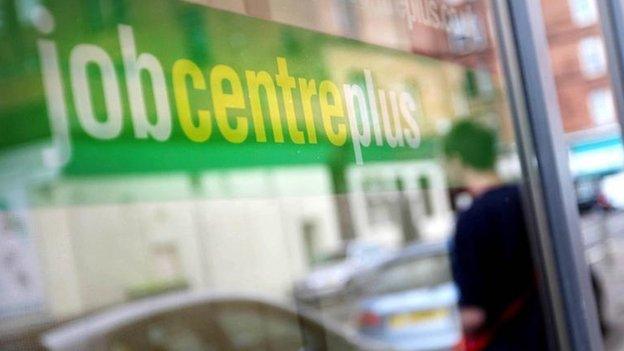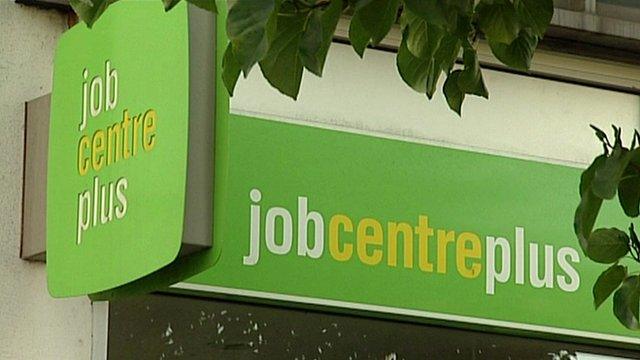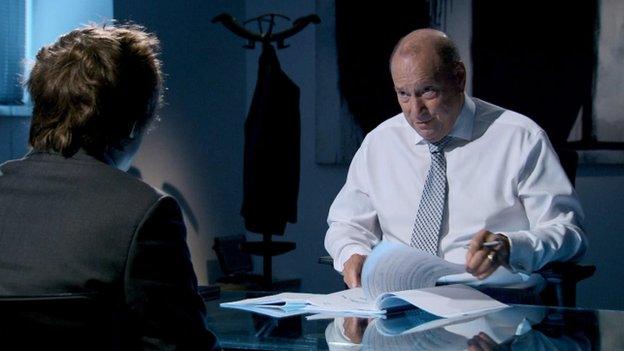UK jobless total falls by 18,000 to 2.49m
- Published
Unemployment has fallen slightly - David Freeman from the ONS analyses the figures
The number of unemployed in the UK fell by 18,000 to 2.49 million in the June-August period, official figures show.
The Office for National Statistics, external (ONS) also said the number of people claiming Jobseeker's Allowance last month fell by 41,700 to 1.35 million.
The unemployment rate drops to 7.7%, down from 7.8% the previous quarter.
The number of people in work, both full-time and part-time, reached a record high of 29.87 million in the quarter, up 155,000.
The ONS looks at demand for full-time work and whether part-time workers would rather work longer hours.
It said almost 1.5 million people were part-time because they could not find full-time jobs, the highest figure since records began in 1992.
The unemployment rate has become a key economic indicator for the Bank of England which, under its recently appointed new governor, Mark Carney, is targeting the unemployment rate.
It says it will not consider raising interest rates from their record low of 0.5% until it falls to 7%.
The ONS also reported average earnings rose by 0.8% in the year to August.
The BBC's chief economics correspondent, Hugh Pym points out this increase in regular pay (excluding bonuses) equalled the lowest recorded in the history of this series.
He adds that the fall of 0.1% in average earnings in the public sector over the year to August was the first time such a decrease had been recorded.
Longer term
There was a sharp difference in the number of men and women in part-time employment, with male part-timers increasing by 21,000 and women in part-time work falling by 13,000.
But more women were finding full-time work than men, with male full-time employment up by 69,000 compared with a rise of 79,000 for women.
Youth unemployment remains just below the one-million mark, with 958,000 unemployed 16 to 24-year-olds, down by 1,000 over the quarter.
The number of people unemployed for more than a year fell by 15,000 to 900,000. Those without work for between six months to a year rose by 29,000 to 446,000, but there was a fall of 32,000 people unemployed for up to six months, leaving 1.1 million in that position.
The worst affected areas in the UK were in Birmingham Ladywood where the unemployment rate stands at 11.4% and in West Belfast where it is 9.3%.
'Standards'
The Prime Minister, David Cameron, said the figures were "good news".
He added: "These are welcome figures. Of course, we all want to see living standards improve, and last year disposable income increased. But the way to deliver on living standards is to grow the economy, keep producing the jobs and cut people's taxes."
The Labour leader, Ed Miliband, said Mr Cameron should admit that there was "a cost-of-living crisis in this country".
Mr Miliband said: "Today's economic figures show a welcome fall in unemployment. They also show that prices have risen faster than wages and that is 39 out of 40 months that living standards have fallen since he became prime minister."
The Institute of Directors (IoD) said the jobs data showed the recovery was "job-lite".
The IoD's chief economist, Graeme Leach, chief economist at the Institute of Directors, said: "Today's labour market figures are not surprising. Just as employment losses during the recession were lower than expected, so too are employment gains with recovery. This isn't a jobless recovery but it is a job-lite one."
The British Chambers of Commerce (BCC) gave a cautious welcome to the figures.
Its chief economist, David Kern, said: "Although concerns remain over youth and long-term employment, the figures show that Britain's labour market is strong and flexible, and that the economy should record satisfactory growth in the third quarter. The large fall in inactivity is particularly pleasing, as more people are returning to the workforce and are looking for jobs."
He added that he expected the unemployment rate to continue to fall steadily and that the 7% unemployment rate targeted by the Bank of England would be reached in the autumn of 2015, a year earlier than the Bank had indicated.
- Published12 June 2013

- Published16 October 2013

- Published20 June 2012

- Published12 January 2015
